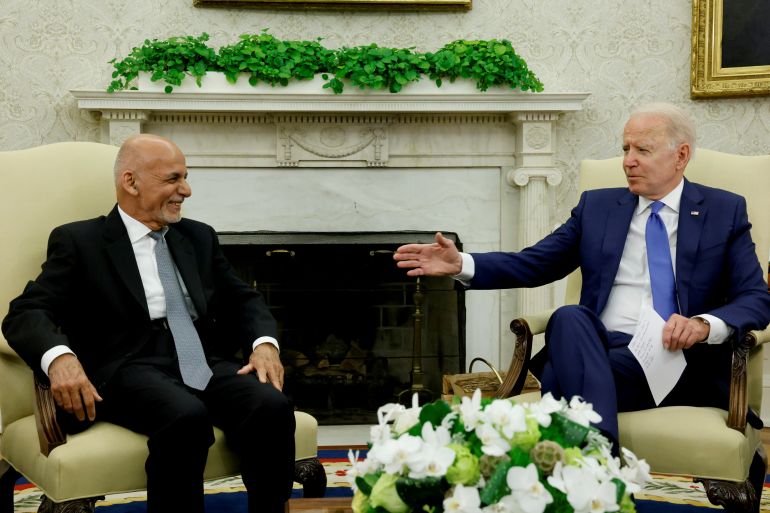It is time to stop playing Jenga with US foreign policy
Imperial hubris leads the US to build towers doomed to fall.

“A terrible time for our country … I don’t know what you call it – a military defeat or a psychological defeat,” said former US President Donald Trump in an August 17 interview on Fox TV. He was referring to the decision of his successor, President Joe Biden, to withdraw American troops from Afghanistan.
Some hours earlier it emerged that the Republican National Committee had removed a webpage from 2020 in which it praised Trump for the “historic peace agreement with the Taliban”.
Although the Republicans are struggling to cover up their support for pulling out of Afghanistan amid the fallout of the messy US departure, they, like the Democrats, have known full well that it was inevitable and had to be done. Media reports show many US government officials knew from early on the war was going wrong and was unwinnable – if the purpose was a political solution without the Taliban.
As the world watches the Taliban re-establish the Islamic Emirate of Afghanistan 20 years after it was toppled by a US-led invasion, one has to ask how is it that Washington harvested such colossal failure? How is it that 40 years after the Vietnam War, it repeated the same mistakes – having no clear goals or exit strategy? After so many US officials expressed doubts about the war, why was there so little courage to plan and execute properly?
Many see international politics as a game, and in this case, the game is clear – Jenga. In Jenga, players remove pieces from a tower and set them on top until the tower falls. Nobody wins at Jenga; one person loses.
Three administrations in a row knew the tower would fall and nobody would win. Still, they pretended in front of the American public that victory was possible and delayed losing by pumping trillions of dollars and sacrificing thousands of civilian and military lives.
They did not prepare for the moment the tower would fall or take steps to help successors manage the eventual collapse. The failure became bigger in the context of promises about nation-building, rule of law, women’s rights and education, cultural change, and “dialogue” with the Taliban. In the end, Afghanistan lost more than 100,000 lives (at least this is what is acknowledged), the US – 2,400.
Our history is littered with similarly doomed foreign policy fiascos in which a short-term bias in favour of coercion preempted the long-term benefits of a consistent policy of engagement and diplomacy.
Afghanistan and Iraq are the most recent examples and Vietnam is a classic one, but there are also the military occupations of Haiti (1915-34), the Dominican Republic (1916-24), Cuba (1906-09), and Nicaragua (1912-33). None of these occupations produced democracy, development, or peace. They all reflect the imperial hubris of the American belief in total victories, which fails to accept compromise or partial achievements (for instance, killing Osama bin Laden should have been enough).
The low politics of buck passing – “the tower will fall but not on my watch” mentality – ignores those like Congresswoman Barbara Lee who called for more time and reflection to take appropriate responses to the 9/11 attacks. Still, we play the game over and over, knowing full well that nobody can win.
It is worth asking what other Jenga predicaments bedevil US foreign policy? What are the other strategies everyone knows will fail but no president wants to take the blame for allowing the tower to tumble?
One place to begin is the raft of questionable unilateral US sanctions that cause tremendous pain and disarray but have never resulted in the intended outcome of regime change. Instead, sanctions cause suffering among large populations and are often counterproductive, providing a nationalist boost to otherwise tottering regimes.
Under the current conditions of the pandemic, sanctions are not only unproductive; they are cruel and they further drain American power. Worse, when unilateral comprehensive embargoes do not work, the typical response in Washington is not to question their rationale, but to expand them with secondary sanctions to third countries.
The most egregious example is the sanctions against Cuba. Most reasonable observers agree the embargo is ineffective, and almost every country in the world besides the US and Israel votes annually at the United Nations to condemn them. Still, no president wants to be the one responsible for reversing the embargo with extraterritorial secondary sanctions, now in place for 60 years.
One could even argue that it helps the Cuban government to rally its population and brings Washington into conflict with almost every major ally around the world. Rather than peeling away from Beijing and Moscow, it pushes Havana towards them. As a result, the US continues its embargo, causes unnecessary suffering to the Cuban people, fails to produce change, and turns the US (not Cuba) into an international pariah in conflict with its own allies.
There is only one way to win at political Jenga – don’t play. Imperial hubris leads us to build towers doomed to fall. Each administration piles on new resources and deaths, hoping to delay the inevitable at least until they leave office. It is time to recognise an unwinnable game as soon as possible – the US should not be an imperial power, should not occupy other countries, and should have the courage to end evidently unsuccessful strategies.
Diplomacy, trade and engagement, multilateralism, and peace, not war or sanctions, should be our default foreign policy tools.
The views expressed in this article are the authors’ own and do not necessarily reflect Al Jazeera’s editorial stance.